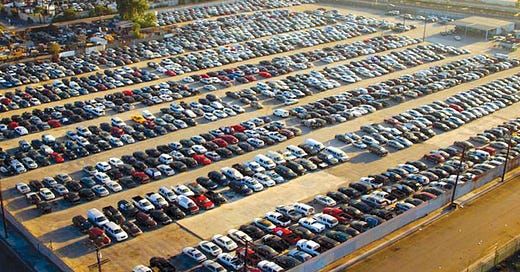Q4 2024 Summary
Business growth:
Copart has continued to grow its business with insurance sellers, driven by compelling service offerings and industry-leading auction liquidity.
The recent decline in used vehicle values has increased total loss frequency, benefiting Copart's business.
Industry trends:
The increasing complexity of vehicles and rising labor rates are expected to continue to drive total loss frequency upwards.
Copart offers sophisticated tools to assist insurance companies in making optimal decisions regarding total loss or repair.
There is a growing economic incentive for insurance carriers to total vehicles rather than repair them.
Title Express service:
Copart's Title Express service has gained traction in the industry, offering insurance companies an integrated one-stop solution for title procurement.
Title Express provides significant efficiency gains for insurance companies, streamlining the title procurement process.
Copart is approaching a run rate of 1 million titles obtained per year through Title Express.
Storm season:
The 2024 storm season has been active, with several hurricanes causing damage in various regions.
Copart has been actively involved in mobilizing resources to support insurance clients in affected areas.
Non-insurance seller business:
Copart has continued to grow its volume with non-insurance sellers, leveraging its core capabilities in physical storage, logistics, and a global buyer base.
Blue car business has shown strong growth, with volume increasing 20.4% year-over-year.
Dealer sales volume has also increased, with a 9.5% year-over-year growth.
Copart believes that its growth among non-insurance sellers is attractive for both economic benefits and maintaining its liquidity advantage.
Purple Wave:
Copart's partnership with Purple Wave has driven 17% year-over-year growth in the equipment auction markets they serve.
Financial performance
Global revenue increased 7% in the fourth quarter and 10% for the fiscal year.
Global service revenue increased 11% for the fiscal year.
Global unit sales and inventory increased 8% and 7%, respectively, in the fourth quarter.
Global unit sales increased 10% for the fiscal year.
U.S. insurance unit volume increased 6% in the fourth quarter and 7% for the fiscal year.
Non-insurance unit volume growth has outpaced insurance unit volume growth.
Global ASPs declined by approximately 5% for the quarter and 3% for the fiscal year.
U.S. insurance ASPs showed resilience and outperformed the broader used vehicle market.
Global gross profit increased 10% for the fiscal year.
Gross margin percentage decreased 340 basis points to 42.4% in the fourth quarter.
GAAP operating income increased 6% for the fiscal year.
GAAP net income increased 10% for the fiscal year.
Free cash flow generated $962 million for the year.
Capital investments totaled $511 million.
Copart remains committed to a long-term investment horizon and disciplined capital allocation.
ROIC and ROIIC are negatively impacted by the build-up of cash on the balance sheet, which greatly increases the invested capital figure. When you normalize the cash balance for the actual cash Copart needs to run the business and reinvest for growth, the ROIC is closer to 30% and the ROIIC is roughy 27% in our estimates.
Goodwill has been included in invested capital, but also reasonable to exclude this to get a better look at underlying organic ROIC & ROIIC.
Note to self: Many investors will refuse to own this name due to not understanding the above, in combination with the high price/earnings ratio. Although stock appears fully priced at the moment based on the latest quarter, look to take advantage of other shareholders selling in the future on headline figures.
Business Model & Re-Investment
Whole car business growth: Copart is investing in its whole car business, including dealer and blue car sales, with the expectation of long-term profitability and growth.
Purple Wave expansion: Purple Wave is expanding its geographic footprint and building its brand presence in the equipment auction market.
Impact of interest rates: Lower interest rates are expected to positively impact the equipment auction market, benefiting Purple Wave's business.
Uncertainty in industry: The industry is subject to various uncertainties, including potential changes in economic conditions and market dynamics.
Copart's focus: Copart remains focused on its long-term strategy of investing in growth, expanding its capabilities, and providing excellent customer service.
Accidents & Repairable Claims
Accident frequency: Accident frequency has been declining over time, driven by factors such as safer vehicles and improved driving practices. However, total loss frequency has increased, outpacing the decline in accident frequency.
Relationship deepening: Copart's Title Express service is helping to deepen relationships with insurance company clients by providing additional value and services.
Jeff Liaw when asked about accident frequency declining:
As to your observation about accident frequency perhaps declining, I think I would characterize that as having broadly been true for the past 50 years period. Accident frequency has always declined, certainly if you adjust for miles driven, a reflection of an ever safer car park, so you can imagine the big waves of innovation in the automotive space. In the mid-1970s, you saw anti-lock brakes arrive for the first time, which reduced crashes, in particular in winter time and with high precipitation conditions. Then the arrival of traction control and so forth in the years thereafter.
Nowadays, autonomous braking, lane departure warning sensors are also reducing accident frequency. That's a longstanding trend. It has always been dwarfed on the other side by total loss frequency. So if accidents are down a little bit, total loss frequency is almost always outpaced that over any reasonable historical period. The one anomaly to that that I can remember, because I remember studying this a couple of years ago when we were talking about this topic then, was I want to say from memory 2013-'14, there was a 2, 3, 4-year period in which accident frequency per miles driven actually increased.
And that, I think, was the adoption of smartphones and social media from while folks were driving, God forbid, but I think that was a catalyst then that has now been absorbed into the numbers. So I think we now see gradually declining accident frequency, but not a precipitous change, not a disruptive change of any kind, we would note.
Title Express & Purple Wave
Title Express service benefits: Title Express offers insurance companies significant time and cost savings by streamlining the title procurement process.
Customer trust: Copart has earned the trust of insurance companies to handle this critical function, demonstrating its expertise and efficiency.
Market share gains: Title Express is contributing to Copart's market share gains by providing a valuable service to insurance companies.
Non-recurring expenses: The $12 million out-of-period expense in the fourth quarter was primarily related to property taxes and vendor invoicing.
Purple Wave expansion: Purple Wave has been expanding its geographic reach and investing in its sales and support team to drive growth.
Virtual business model: Purple Wave's virtual business model allows for efficient expansion and scalability.
Insurance Market Dynamics
Impact of lower insurance rates: Lower insurance rates may lead to an increase in uninsured vehicles and a decrease in total loss frequency, which could negatively impact Copart's business. However, the impact is expected to be modest.
Non-insurance unit growth: Copart's growth in non-insurance unit volume is driven by a combination of factors, including increased focus on fleet rental and finance units and the shrinking of the low-value car market.
Market Share Gains, Storm Expenses & Yard Growth
Insurance unit growth: Copart's insurance unit growth in the fourth quarter was driven by a combination of organic growth and market share gains.
Storm-related expenses: The company incurred higher yard operation expenses due to preparations for storms that did not result in significant unit volumes.
Real estate portfolio expansion: Copart's expansion of its real estate portfolio has contributed to increased yard operation expenses, including property taxes.
Operational efficiency: Copart is focused on improving its operational efficiency and leveraging its scale to optimize costs and maximize profitability.
Non-Insurance Business Mix
Non-insurance business mix: Copart's non-insurance business is composed of several segments, including blue car sales, dealer sales, and cash for cars.
Buyer base: Copart's buyer base is diverse, with both domestic and international buyers participating in its auctions.
Fee increases: Copart does not disclose its fee schedules publicly, but it emphasizes its commitment to providing value to its customers and maintaining a competitive pricing structure.








Love your transcript notes, but maybe consider putting a name including company name and maybe quarter too.